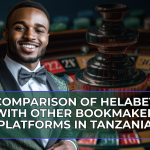
Gamblers in Argentina have been living in a new reality in recent years. Online sports betting and casinos, which used to be banned or in a grey area, are now legalised. Operators like 1win are growing and growing, especially in provinces like Buenos Aires. But along with the growth comes an interesting question: won’t all these areas merge into one big, flexible platform where you can bet on a match and spin a slot without switching between sites? Let’s try to answer this question in our article.
Why is All This Even Happening
Firstly, the Argentine gambling market is showing quite an invigorating dynamic. According to Bonafide Research, online gambling in the country could exceed $2.4 billion by 2028. That, for a moment, is more than the budget of many local ministries.
What does that mean? That more and more people are playing online. Through mobile apps, on platforms like 1 Win, Bplay or Codere. Some go to casinos out of interest, others follow football matches and bet live. And increasingly, it’s the same person.
How Things Work Now: In Simple Words
The most interesting part is in how the market works. There is no single federal law on gambling in Argentina. Each of the 23 provinces and the city of Buenos Aires play by their own rules. Literally. Somewhere online betting is legal, somewhere it’s not. Somewhere you can open a casino, but in a neighbouring province you can’t. As a result, one platform can be available in one province and blocked in another.
But it is Buenos Aires that sets the tone. Legal operators have been operating there since 2020, and they are the ones who most often offer players both casino and betting options. For example, at 1 Win you can bet on the River Plate vs Boca Juniors match and then immediately open roulette.
How Betting and Casino Platforms Already Work under One Roof
Today, there are more and more sites and apps in Argentina where a player doesn’t have to switch between different platforms to bet on sports and play online casino at the same time. This is no longer a rarity, but a working standard on legalised services like 1Win, Bplay, Jugadon.
The most notable feature of these hybrid operators is a unified ecosystem. That is:
- One account – you sign up once and this gives you access to all areas of the site;
- Shared wallet – no need to transfer money from your betting account to your casino account, the balance is shared;
- The interface logic is the same – whether you’re in slots or betting lines, navigation remains predictable and user-friendly;
- Mixed promotions – for example, the same bonus can apply to both Express and Roulette if the conditions are met.
In some apps there is even cross functionality: you are in the live betting section, and at the bottom of the screen there is a banner with access to the top slots. Or vice versa: you spin a slot, go to the menu, and immediately get a reminder of the start of the match you were going to bet on.
Users are responding positively to this. According to local marketing reports (including InfoPlay and Yogonet), player engagement increases when players have a choice within one platform. And operators get a higher average cheque and better customer retention.
Why Argentina Still Doesn’t Have a Unified Betting and Casino Platform
Despite technological readiness and user interest, the full-fledged integration of casino and sports betting in Argentina is still being held back – primarily by regulatory confusion. The problem is not a lack of demand or technical capacity, but rather the way the country’s gambling system is organised.
Argentina is a federal state and there is no single law regulating online gambling across the country. Each province decides for itself what to allow, how to licence and who to let into the market. As a result, we have a situation where:
- Buenos Aires already has international operators with full platforms – with casinos, betting, bingo, etc.;
In the province of Cordoba, only sports betting is allowed, and then through a limited number of local operators; - And in some regions, such as San Juan or Formosa, online gambling still has no clear legal status.
This variation creates legal barriers for operators like 1Win. In order to operate nationwide, they need to obtain licences in each province separately, adapting to different regulations. In some places this is possible, in some places it is not economically feasible, and in some places it is simply prohibited.
Hence the main problem: even if the operator himself wants to launch a hybrid platform, he does not always have the right to do so. In one region it may show only the betting section, in another only the casino. This prevents the creation of a universal product that is equally accessible throughout the country.
What Happens Next: A Possible Forecast
If we focus on the current dynamics, in 3-5 years we will see a much more connected ecosystem. There will be fewer specialised sites, and more hybrids like 1 Win, where casino and sports go hand in hand.
Three possible directions of development can be distinguished:
- Unification of interfaces – players will think everything is unified, even if legally it isn’t;
- General bonus systems – players will be able to earn points for betting and spend them at the casino;
- Uniform access across the country – if there is federal regulation, the issue of boundaries between provinces will fall away.
Final Thoughts
The Argentine gambling market is still in the customisation phase. But the player is already showing that he doesn’t want to jump between sites and apps. He wants to go in, choose himself what to do, and do it without too many clicks. And everything is coming to the point where this user behaviour is what will shape the market.
Casinos and betting are likely to merge because it’s convenient. Both for operators like 1Win and for the players themselves.










